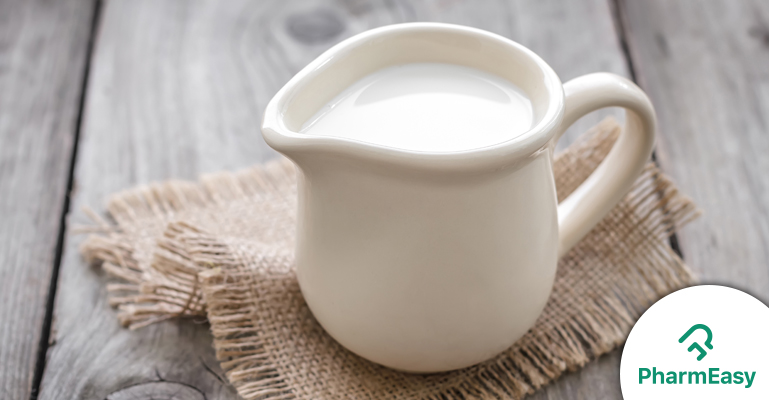Milk Benefits Vs Risks! Evaluate Yourself.
By Nikita Banerjee +2 more

Download PharmEasy App




Register to Avail the Offer
Send OTPBy continuing, you agree with our Privacy Policy and Terms and Conditions
By Nikita Banerjee +2 more
Every household sings the saga of the amazing benefits of milk and from time immemorial, cow’s milk has been a well-known health drink the world over. It contains invaluable nutrients and thereby blesses our body with innumerable benefits. Calcium, one of the key constituents of milk, is known to improve bone health.
However, there are many people who find it difficult to digest milk. That is because their body is not attuned to digesting lactose, the sugar in the milk. Basically, the reason for this is that their body is not capable of producing enough quantities of the enzyme ‘lactase’. This is the enzyme that is needed to digest the milk properly. Let’s learn all the health benefits and risks of milk in this article.

Table of Contents
Milk is a powerhouse of calcium, an essential component of healthy bones and teeth. Cow’s milk is also rich in Vitamin D, another vital element for good bone health. Both of these important components help to keep osteoporosis at bay. Read more about foods for strong & healthy bones.
Cow’s milk is also a source of potassium which helps to lower blood pressure. Increasing the levels of potassium and decreasing the levels of sodium help to keep a check on cardiovascular diseases.
On the flip side, milk also contains high levels of saturated fat that can be linked to the increased chances of heart diseases.
Read more about 20 tips for the essential heart.
Researchers have found that cow’s milk may promote muscle building. All the essential amino acids (the ones our body can’t synthesise) are present in cow’s milk, making it a rich source of high-quality protein. Along with this, it may inhibit muscle tissue from being utilised for energy. Low-fat milk may offer milk advantages while containing less fat.
Dr. Siddharth Gupta, MD
Adequate levels of Vitamin D in the body helps in the production of serotonin, the hormone which is linked to appetite, sleep and mood. Deficiency of Vitamin D leads to depression, PMS and a feeling of fatigue.
Many researchers suggest drinking milk every day to reduce the growth of this disease.
This condition is different from lactose intolerance. Here, on consuming milk, one experiences wheezing, asthma, vomiting, diarrhoea and similar kinds of gastrointestinal problems.
Many others also experience skin rashes, allergies, rhinitis or inflammation in the nose.
Researchers have found that the oestrogen and growth hormones included in dairy milk may affect the regulation of hormones in humans. In a 2016 study on mice, scientists discovered that mice who drank milk with high oestrogen levels had hormonal alterations. In my opinion, one should consult their doctor if any irregularities are seen in the body’s functioning.
Dr. Rajeev Singh, BAMS
Also Read: Benefits of Colostrum: A Deep-Dive Into its Health-Boosting Properties
Excessive intake of calcium creates unwanted side effects such as kidney stones and constipation. In some cases, it also increases the risk of deposition of calcium in the arteries thereby raising the risk of heart ailments.
This condition can be fatal for those whose kidneys are not functioning properly. An excessive residue of both potassium and phosphorus in the body can be extremely harmful. While drinking milk is essential, it is crucial to consider all the health benefits and risks of milk as well.
Also Read: The Health Impact: Understanding Organic Milk Benefits
Disclaimer: The information provided here is for educational/awareness purposes only and is not intended to be a substitute for medical treatment by a healthcare professional and should not be relied upon to diagnose or treat any medical condition. The reader should consult a registered medical practitioner to determine the appropriateness of the information and before consuming any medication. PharmEasy does not provide any guarantee or warranty (express or implied) regarding the accuracy, adequacy, completeness, legality, reliability or usefulness of the information; and disclaims any liability arising thereof.
Links and product recommendations in the information provided here are advertisements of third-party products available on the website. PharmEasy does not make any representation on the accuracy or suitability of such products/services. Advertisements do not influence the editorial decisions or content. The information in this blog is subject to change without notice. The authors and administrators reserve the right to modify, add, or remove content without notification. It is your responsibility to review this disclaimer regularly for any changes.
Comments